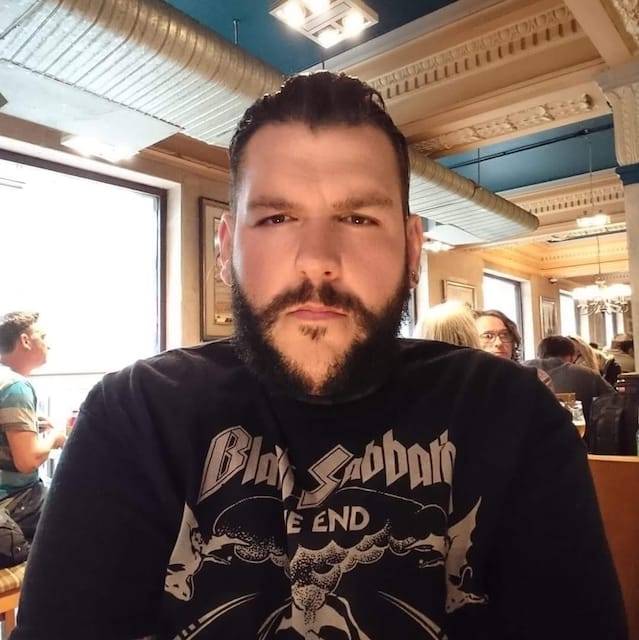It started with an uneasy feeling in my chest; a perceived irregular beat. My heart raced as I attempted to compose myself through the sensation of a chill trickling through my veins to the tips of my fingers and washing across my face.
[like_to_read][/like_to_read]
I couldn’t sit still, I jumped up and made my excuses. I felt dizzy, out of control, all while my heart continued a relentless fight to thump right out of my chest. Terrifying thoughts defeated any logical thinking, my brain settling on the worst case scenario: it must be a heart attack.
And then.
Nothing.
I did not faint. Or collapse. My heart remained intact.
At the time, I was half way through a Media Production degree. Within just a few weeks, panic attacks had become routine for me, seeping into my lifestyle like a clingy alien symbiote.
They struck me at the most unusual times; as I lay in bed or as I settled to watch TV. I remember fidgeting through an attack as I sat as a passenger in a car with my course workgroup, pulling at my collar, feeling trapped and frantic as I tried to conceal my reality from the people around me; I thought I was dying.
It’s like that momentary flash of panic you experience when you have a near miss collision, except it’s constant and unforgiving. When you’re in its grips, all logical thinking dissipates. Your body takes over, blood rushing to your extremities, leading you to falsely believe that you are in immediate danger.
I thought about why my panic attacks would manifest at such a successful time in my life. I was seemingly doing well, achieving high grades for the first time.
As I delve into my memories, it becomes apparent to me that those times were more chaotic than I had been admitting to myself. I was homesick. As a natural introvert, it took me a long time to form new relationships with people; I was two years into my course when I really found my friendship circle.
I had become highly critical of myself, I had formed unrealistic expectations of how I should be (I remember at one point, absurdly announcing to my counsellor that I didn’t know how I would cope if I didn’t achieve first class honours for my degree).
I became obsessive over food, at first forcing myself to shed three stone over the course of the summer and then beginning a ritual of secretly binge eating which would go on to infiltrate my eating habits for almost a decade. Similarly, I binged on alcohol to excess, alienating people in the process and worrying constantly about my unacceptable behaviour, at one point calling my mum, admitting I felt like I wanted to throw myself in front of a train.
In other news, my parents were divorcing. My father’s behaviour towards me had changed, and our relationship disintegrated.
Without being conscious of the fact, my panic mostly resolved itself with time. It was never truly gone, moments here and there were charred by heart flutters and breathlessness. My coping methods calmed threats of a full-blown anxiety attack; at the slightest hint of panic I would get up and pace around from room to room, take deep breath, get some air. I also found sitting forward (think brace position on a plane) really effective if my anxiety struck in bed or on a flight.
A few years later, my panic famously struck again as I lay awake during my c-section. I imagine because I was confined to the operating table, unable to practice my coping methods.
Life changed entirely for me then. A year down the line, I was a single mum relocating to an entirely new place to be closer to family and support. My job demanded crazy work hours. As someone who doesn’t like to let people down, I insisted on working full-time unsociable hours, at a significant cost to my sleep, health and sanity.
I seemed to manage for a couple of years then one day, as I was at home, I was looking at my laptop when the screen went fuzzy with stars and pixels. The familiar panic gripped my chest so I threw the laptop to the side, jumping up to relieve the feeling. But this felt different. The sensation of being light-headed was overwhelming, my sight was tinted with a dark filter, my body felt numb, my legs buckled. I got on the floor for fear of passing out. Within a few moments, the intense feelings passed.
They returned at scary times. Once, when I was driving with my son in the back. I somehow managed to pull over before the dizziness became too consuming. Another time, at the top of the stairs, I lost the feeling in my legs as I fought the sensation of vertigo. I managed to throw myself onto the carpet, in preparation for losing consciousness. Every time, I felt paralysed, unable to speak.
I sobbed on the phone to my doctor’s receptionist attempting to arrange an emergency appointment. At the time, I believed there must be something more sinister going on, maybe these were actually seizures.
When my doctor diagnosed anxiety attacks I went to see another for a second opinion, arguing that I usually get up and keep myself busy to distract myself, but that in these cases I had been physically unable to stand up.
I was prescribed Fluoxetine which successfully subdued my attacks. I carried on giving myself to my job, juggling the demands of work, motherhood, running a household and life. I felt constantly sick, endlessly tired.
About a year later, I found myself breaking down at work, unable to stop crying, to carry out my work or even drive myself home. I had hit boiling point. After a little bit of time off, I made the excruciating decision to let my standards down and reduce my hours to part-time.
A part of me believes those renewed, more intense attacks were my body’s way of communicating with me that something had to give. In much the same way, when I was at university, perhaps my body was trying to tell me something.
This makes me wonder if anxiety symptoms should be numbed with drugs, or if we should endure the experience and learn to listen to them.
Now, when I feel that pang of anxiety, albeit watered down by medication, I try to remind myself to take a look at my lifestyle. Have I taken too much on? Is there something, seemingly unrelated, that is draining my energy? My body is built to survive, to overcome. The ancient ‘flight or fight’ response is designed to alert me to threats to my survival. What stressors in my life am I not noticing that could be harmful for my mental health?
If you, or anyone you know, can identify with some of the experiences I’ve described then perhaps the following advice might be useful.
If you are suffering from anxiety attacks:
Try to remember that you’re not in danger. It can be extremely frightening to have an attack; you are experiencing that same emotional and physical responses that you would experience if you were threatened with a dangerous situation. Physical symptoms might include things like racing / irregular heartbeat, dizziness, chest pain, hyperventilation or vomiting. However, panic attacks are never fatal!
Learn about your flight or fight response. Educating myself about why panic attacks occur really helped me cope. Our bodies, when we are scared, produce chemicals like adrenaline and blood rushes to the major organs to allow us to either fight or run away from danger. This would have been extremely helpful to our survival thousands of years ago when humans may have found themselves running away from wild animals but of course life these days is a little more mundane. However, modern life still exposes us to an extortionate amount of everyday stress that can trigger the same response from our nervous system.
Learn coping methods. Everyone’s experiences of panic attacks are different so you will have to experiment to find what works for you. Some practical methods could include breathing in and out slowly and deeply, or getting up and doing something active when you feel those first inclinations of an oncoming attack.
Seek help. There is treatment available for anxiety attacks, usually in the form of talking therapies and sometimes medication. Cognitive Behavioural Therapy is a talking therapy that is commonly used to treat anxiety and helps change your mindset when it comes to stressful situations. Talk to your GP about accessing treatment. There is also a wealth of information on the internet and in print form for anxiety sufferers. Mental health charities like Mind have some brilliant guides that you can download. Talk to people close to you too, they might be able to help distract you from the feelings you’re going through, offer support and help you work through some of the irrational fears you might experience during an attack.
Look after yourself. Exercise can sometimes help prevent anxiety attacks, as can avoidance of caffeine and other stimulants. In the aftermath of a panic attack, you will likely feel exhausted, emotional or even scared (you may fear that you may have another one) so try to get rest and be as kind to yourself as you can.
If someone you know is having an anxiety attack:
Stay calm. Being around someone when they are experiencing attack can sometimes be scary or confusing. Panic attack sufferers are not in real physical danger but the feelings they are experiencing are absolutely real as their body is responding in exactly the same way it would if the person was facing a frightening situation, such as impending death. You may not understand what it is that is triggering their panic but try to be empathetic towards how fearful they may be feeling.
Gently dispel any untrue statements. Some things that anxiety sufferers may say to you might make no sense because you know they are not true, but in the middle of an attack it can be difficult to think clearly and logically. I often have attacks when I am going to fly somewhere, because I 100% believe that the plane will crash. When I am in this state of non-rational thinking, it could be helpful to me (and I say “could be” because some sufferers may not want your advice, if that’s the case, don’t take it personally) to be reminded that I have flown successfully many times before, that thousands of flights take off and land every single day without any problems and that I am in actual fact not able to predict the future.
Distract them. Talk to them. Inject a little sense of humour. I’ve found many times that engaging with someone before a full-blown attack occurs can take my focus away from my symptoms and calm some of the intrusive thoughts that accompany them.
And let them do what they need to do to cope, without judgement. If they need to get up and pace around, go outside for air or get on the floor for stability just let them. Confinement can sometimes exacerbate anxiety. Likewise, if they hold the belief that their time is up (as farfetched as that mind sound to you) and they want you to hold them, be supportive and do just that.





